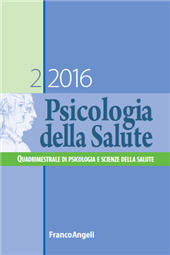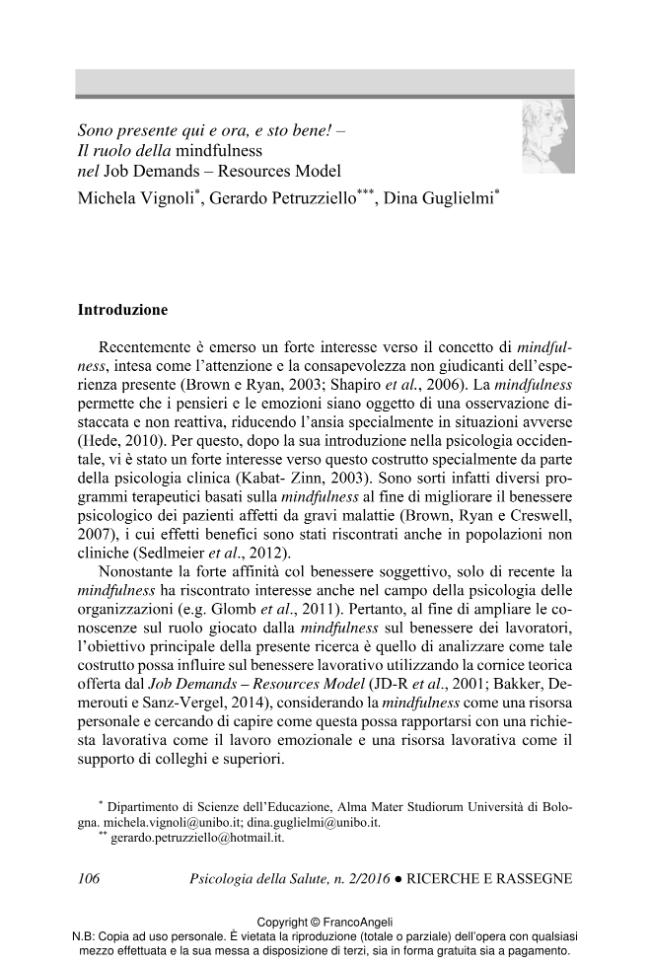2016 - Franco Angeli
Article
Digital Version
Download | Copy/paste | Printing
Sono presente qui e ora, e sto bene! ; Il ruolo della mindfulness nel Job Demands ; Resources Model
106-126 p.
- L'obiettivo della presente ricerca è quello di investigare il ruolo della mindfulness â «una consapevolezza che emerge facendo attenzione intenzionalmente, nel momento presente e in modo non giudicante allo schiudersi dell'esperienza momento per momento (Kabat-Zinn, 2003)» â sul benessere lavorativo, considerandola come risorsa personale nel modello Job Demands â Resources. È stato ipotizzato che la mindfulness moderi l'effetto della richiesta lavorativa di surface acting sull'esaurimento emotivo. Inoltre è stato ipotizzato che la mindfulness possa esercitare un effetto negativo indiretto sull'esaurimento emotivo riducendo la percezione di richiesta di surface acting e un effetto positivo e indiretto sul work engagement, incrementando la percezione di supporto ricevuto da parte dei colleghi e dei superiori. I risultati dello studio, condotto su un campione di 316 persone impiegate in una catena di supermercati, hanno confermato le ipotesi. Sono discusse implicazioni per la ricerca futura. I risult
- ati su.
- ggeriscono l'importanza di sviluppare la mindfulness nelle organizzazioni per promuovere il benessere delle persone al lavoro, perché permette loro di fare fronte alle richieste lavorative e di incrementare le risorse lavorative, che a loro volta possono migliorare la motivazione.
- The aim of the present study was to investigate the role of mindfulness -«an awareness that emerges through paying attention on purpose, in the present moment and non-judgementally to the experience that unfolds moment by moment (Kabat-Zinn, 2003)» - on workers' well-being, seeing it as personal resource in the Job Demands-Resources model. It was hypothesized that mindfulness may buffer the impact of surface acting, seen as job demand, on emotional exhaustion. It was also hypothesized that mindfulness may act a negative and indirect effect on emotional exhaustion through the mediation of reduced surface acting and a positive and indirect effect on work engagement as well, enhancing the perception of support from colleagues and supervisors. The results of the study, carried out on a sample of 316 employees of an Italian supermarket chain, confirmed the hypotheses. Implications for future research are discussed. The results suggest the importance of developing mindfulness in organizations in order to promote wo
- rkers' well-being, because it enables them to cope with, or reduce, job demands and to increase job resources, which in turn enhance motivation at work.
-
Information
ISSN: 1972-5167
KEYWORDS
- Mindfulness, risorse lavorative, surface acting, esaurimento emotivo, work engagement, job demands-resources model
- Mindfulness, job resources, surface acting, emotional exhaustion, work engagement, job demands-resources model
-
In this issue
- Benessere lavorativo in operatori sociali : le richieste e le risorse lavorative e personali emerse da una indagine esplorativa
- Il volontariato nelle cure palliative : religiosità, rappresentazioni esplicite della morte e implicite di Dio tra deumanizzazione e burnout
- Assertività e soddisfazione degli studenti nelle transizioni scolastiche : una ricerca nella scuola secondaria superiore
- Se io fossi Ben : adolescenti a confronto con una ipotetica gravidanza
- La qualità della vita e il rischio psicopatologico dei pazienti ustionati : una revisione narrativa della letteratura
- Sono presente qui e ora, e sto bene! ; Il ruolo della mindfulness nel Job Demands ; Resources Model
- Adattamento di coppia, cogenitorialità e benessere psicologico dei figli : uno studio esplorativo
- È come avere delle catene alle ginocchia : la creazione di un libretto per spiegare l'Artrite Idiopatica Giovanile secondo un approccio socio-costruttivista



